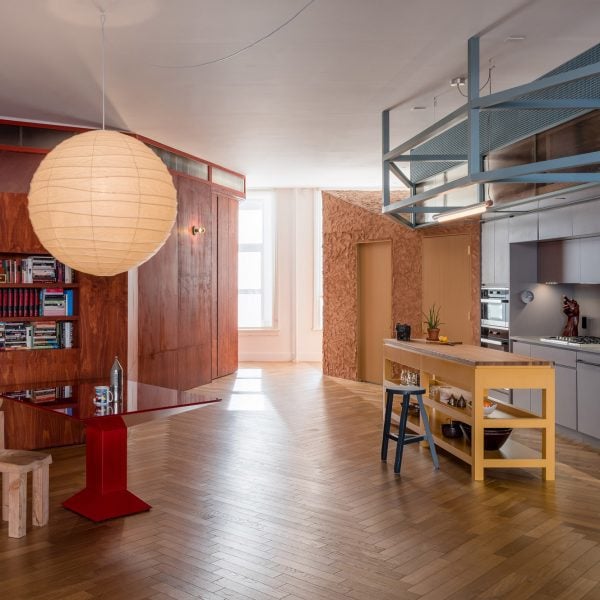[ad_1]
In this renovated loft in Brooklyn, the owner both resides and hosts public art performances within a space divided by a variety of inserted volumes.
The loft is located in a late 19th-century cast iron building in Williamsburg that once served as a hat factory, and was renovated by a team of architects.
Ignacio G Galán, Jesse McCormick, Khoi Nguyen and Julie Tran of Future Projects collaborated to turn the industrial space into a residence that could also serve as a venue for artistic performances and other public events.
Named Another Seedbed, the project recalls the use of lofts in New York City by artists in 1960s to 1980s for developing experimental works.
The owner and activator of this apartment began organising parties, performances and other events in a similarly industrial space in Bushwick.
He then decided to create a dedicated space for himself to live and work, as well as host other artist friends who needed square footage to bring their ideas to life.
“Neither just a private studio nor an art gallery, the space is equipped to welcome gatherings that operate between a dinner party and a public performance,” said the project team.
“Artists appropriate the space and become hosts themselves, expanding the communities which the project brings together.”
The apartment is organised as a largely open-plan space, with private areas concealed inside inserted volumes.
Red-stained pine plywood panels hide the bedroom, which is accessed via a concertina door, and also contain storage.
The bathroom occupies another volume that’s covered in hand-troweled earthen clay plaster outside and lined entirely is blue penny-round tiles inside.
An open kitchen with grey cabinetry sits below a framework of coloured wood, featuring smokey polycarbonate panels that are lit from behind.
This frame extends into the living area to form a floor-to-ceiling shelving unit, on which books and objects are displayed, and a projector for screening videos onto the opposite wall is housed.
A variety of moving furniture pieces, including an ochre-toned sofa on wheels, help to choreograph the events and arrange the apartment as desired by whoever is using it.
“The space will not advertise its performances,” said the team.
“Some neighbors might not know of its existence. Others will hear about an event through friends. Some might find themselves there often and will develop networks of neighbourliness within it.”
Brooklyn has both a thriving arts scene and a wealth of defunct industrial buildings for hosting exhibitions, performances and events.
Herzog & de Meuron recently completed the transformation of a derelict power plant in the borough into arts centre, while the Public Records creative venue added a bar and lounge on an upper floor of its former warehouse building earlier this year.
[ad_2]

